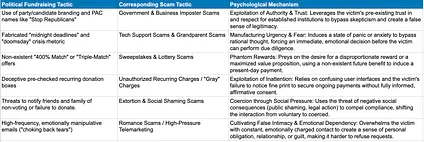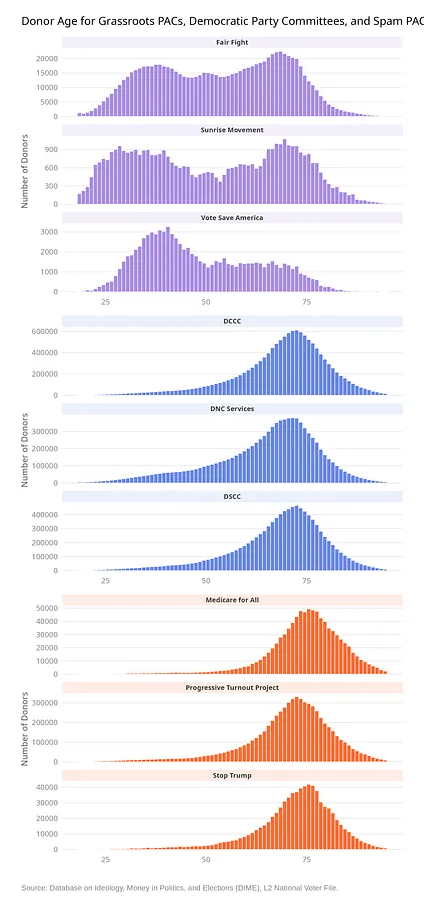> [!Bullhorn's Take]
> ## We think...
### One 89-year-old woman made 7,532 donations totaling $68,666
In a [recent article](https://data4democracy.substack.com/p/the-mothership-vortex-an-investigation), I broke down how the spam PACs flooding our phones and inboxes spend exorbitant amounts on fundraising and consulting fees. The kind of Democratic fundraising messages we’ve all seen—the fake deadlines, the phantom matches, the claims that operatives are "choking back tears"—prompts a question: Who could possibly fall for this?
It's the same question people ask about Nigerian prince emails and tech support scams. The answer, it turns out, is the same. These tactics aren't designed to fool everyone. They're designed to target and exploit vulnerable populations, particularly elderly Americans. Just as online scammers deliberately include obvious red flags to filter out skeptical recipients, political spam operations use over-the-top emotional manipulation to find donors who will respond to increasingly aggressive tactics.
This is an important question because the answer informs our understanding of the problem at hand and what solutions are viable. Are the donors to these spam PACs just like any other political donors, or are they systematically different? I calculated the age of donors giving to these spam PACs, and the figure below compares their age distribution with that of ActBlue donors who gave directly to presidential campaigns.
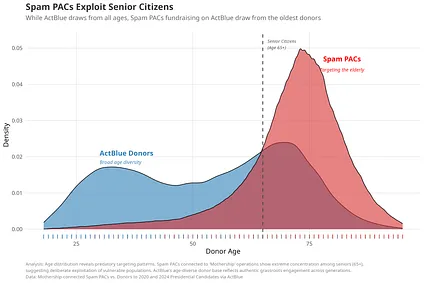
What the data reveals is troubling: these spam PACs are part of a system engineered to target and extract money from seniors.
My analysis of the FEC filings in "The Mothership Vortex" established that the "necessary evil" defense for spam PACs is nonsense. At least the “necessary” part is. What's been pitched as a grassroots fundraising movement looks a lot like a large-scale operation that has imported the tactics of elder financial fraud.
These deceptive tactics can be seen in the fundraising records of party committees and candidates who make use of them. For reference, I’ve included three prominent candidates whose fundraising frequently and relentlessly employ deceptive fundraising tactics: [Nancy Pelosi](https://politicalemails.org/organizations/655) (D-CA), [Hakeem Jeffries](https://politicalemails.org/organizations/220) (D-NY); and [Suzan DelBene](https://politicalemails.org/organizations/15) (D-WA), the current chair of the DCCC. (You can see an archive of their fundraising emails at politicalemails.org).
The Democratic Congressional Campaign Committee (DCCC), the Democratic Senatorial Campaign Committee (DSCC), and other official party organs have adopted the same tactics. When the party's own campaign committees send all-caps texts and emails claiming nonexistent "400% matches” or manufactured deadlines, they legitimize and normalize the exploitation.
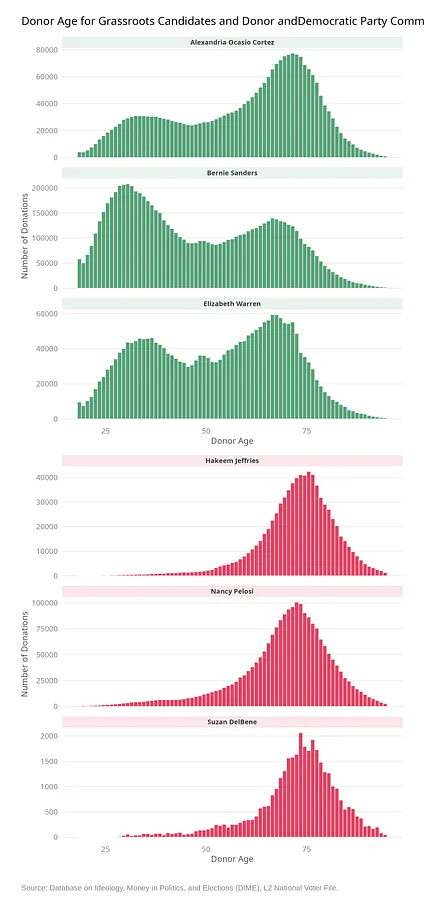
Mothership’s aggressive fundraising tactics have been described as “churn and burn,” but a more apt description is “hook and squeeze.” Most of their donations are coming from individuals who donate 10 or more times to spam PACs. Spam PACs have raised an astounding amount of money, but when you dig into the data, you find that a staggering $540 million of that raised since 2020 has come from this group of captivated donors.
Consider just a few of the many extreme cases:
- An 89-year-old woman from Indianapolis has made 7,532 separate donations totaling $68,666. That's an average of over 10 donations per day, every day, for more than two years.
- An 84-year-old man from Oxford, Ohio, has given $194,322 through 2,271 individual transactions. He is not employed and likely retired.
- A 79-year-old woman in Missoula, Montana, made 3,177 separate donations.
- An 80-year-old man in Niceville, Florida, was solicited 2,793 times for over $100,000.
Worse still, these seniors don’t look to be wealthy. Public records show the donors profiled here live in homes valued between $300,000 and $500,000, and are located in rural areas or middle-class neighborhoods. This suggests it is a substantial financial burden on these seniors and their families.
Up until this point, I had been operating under the assumption that the bizarre messaging generated by Mothership was the sad result of a long series of A/B tested messages, slowly evolving into language that appears unhinged but is weirdly effective at scale. Now having read up on scams targeting seniors, I no longer believe that some algorithm wandered upon these tried and true scamming tactics.
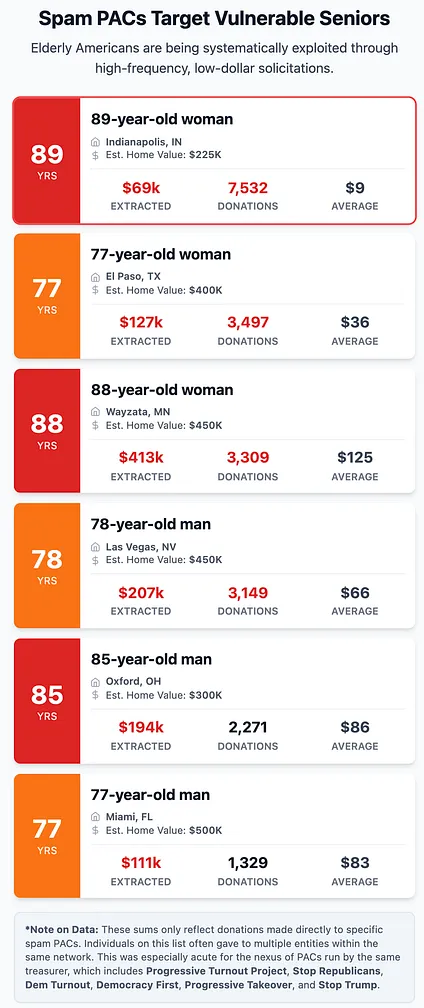
The tactics employed by spam PACs share similarities with those used by financial scammers who have targeted seniors for decades. The Federal Trade Commission, AARP, and state attorneys general have spent years documenting and combating these tactics.
Political parties around the world have relied on many different ways for funding. They have relied on special interests, party membership fees, and public financing. In some corners of the world, they’ve even been funded by drug cartels. But I am unaware of another example, outside the United States, where political parties have resorted to a model built on exploiting seniors.
The complicity of official party committees makes this particularly frustrating. When the DCCC and DSCC employ the same deceptive tactics as the most exploitative spam PACs, they provide cover for the entire ecosystem. They signal that deceiving elderly donors is sanctioned behavior, no matter how dishonest and unethical.
The party needs to rethink its fundraising philosophy. This isn't sustainable politically or ethically.
The power to stop this rests squarely with party leadership. If Chuck Schumer, Hakeem Jeffries, or Ken Martin want to clean up this mess, there are concrete steps they can take right now.
First, they can publicly and forcefully back the new rules put in place by ActBlue. In August of 2025, ActBlue updated its policies to explicitly prohibit "aggressive, unethical, or deceptive fundraising behavior that abuses donor trust". These rules give the platform grounds to deplatform PACs and candidates who use misleading solicitations. A strong statement of support from party leadership would not only amplify these rules but also send a clear message to all fundraising vendors that the era of exploiting donors is over. Public backing would also empower ActBlue to enforce its policies more aggressively, knowing they have the support of the party establishment. Currently, the silence from the party leadership signals the opposite.
Second, party leaders can and should blocklist vendors who engage in these predatory tactics. The Democratic campaign committees, such as the DCCC, have a history of creating blocklists for vendors who work with primary challengers to incumbents. While that policy was controversial, it proves that the infrastructure for holding vendors accountable already exists. It is time to repurpose that tool for a more ethical cause: protecting elderly and vulnerable donors from financial exploitation. If a vendor is found to be using deceptive practices, they should be barred from working with any and all Democratic campaigns. This would create a powerful financial incentive for vendors to clean up their act and would quickly starve the most egregious offenders of the revenue they need to operate.
This would be such an easy win for the party. Voters hate the spam but not half as much as donors do. Not only do spam PACs not contribute to the party’s finances, the use of these deceptive fundraising tactics by spam PACs and candidates and party committees alike has turned a huge segment of supporters off from ever donating again.
Political movements require funding, but they also require trust. Every dollar extracted through deception erodes that trust—not just with that individual, but with their families and communities who witness the exploitation. When adult children discover their parents have been drained by political fundraising operations using tactics reminiscent of common internet scams—but bearing the brand of the Democratic Party itself—the damage extends far beyond the financial.
The numbers are clear. The targeting is deliberate. The reform path is obvious. What remains is the political will to protect the very supporters who built the progressive infrastructure these consultants now profit from. They deserve better than to have their political engagement reduced to a series of increasingly desperate text messages designed to separate them from their savings. And we deserve better than a party leadership that lets this happen.
\_\_\_\_
**Table 1: Tactical Parallels Between "Spam PAC" Fundraising and Common Financial Scams**
